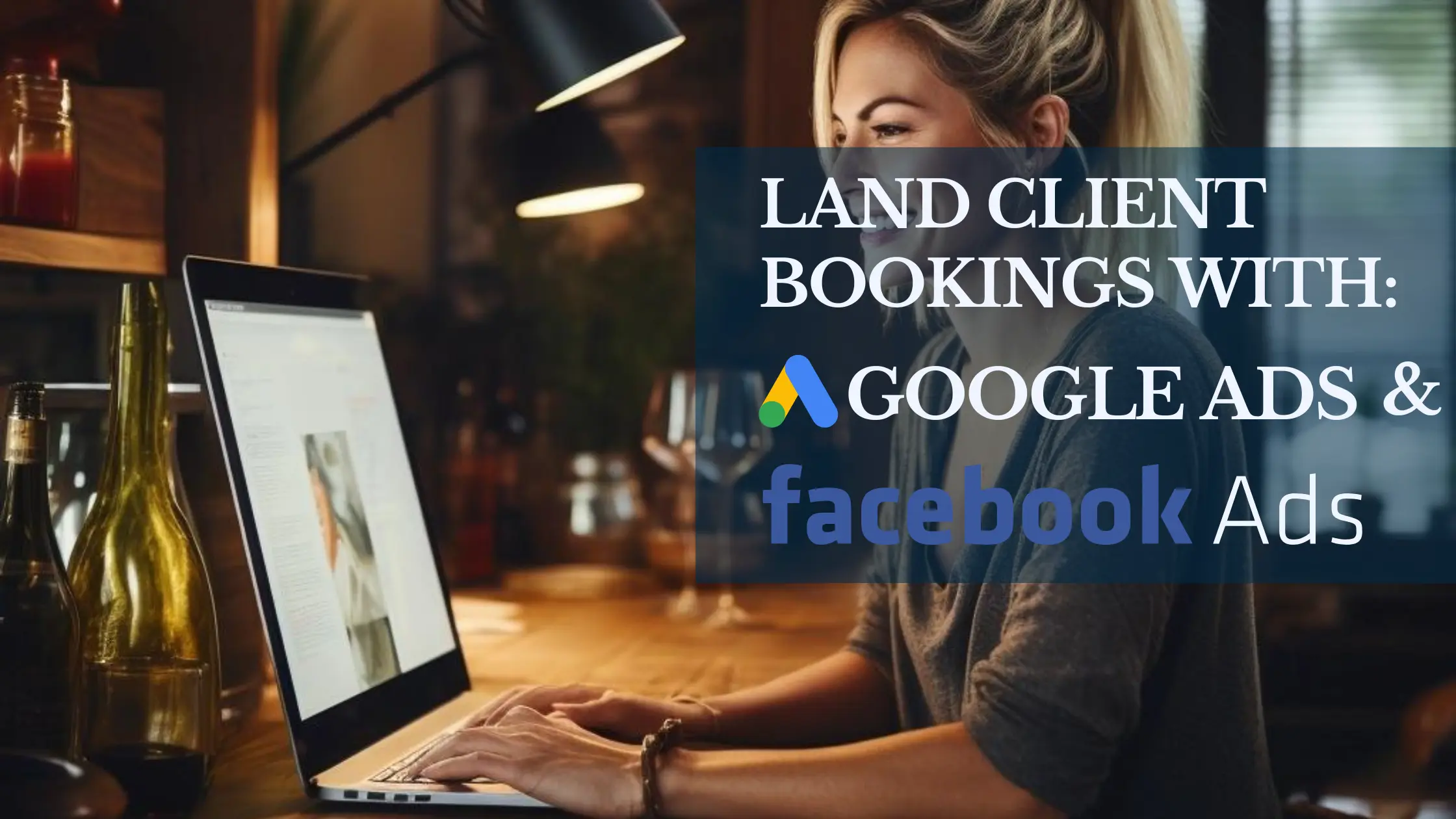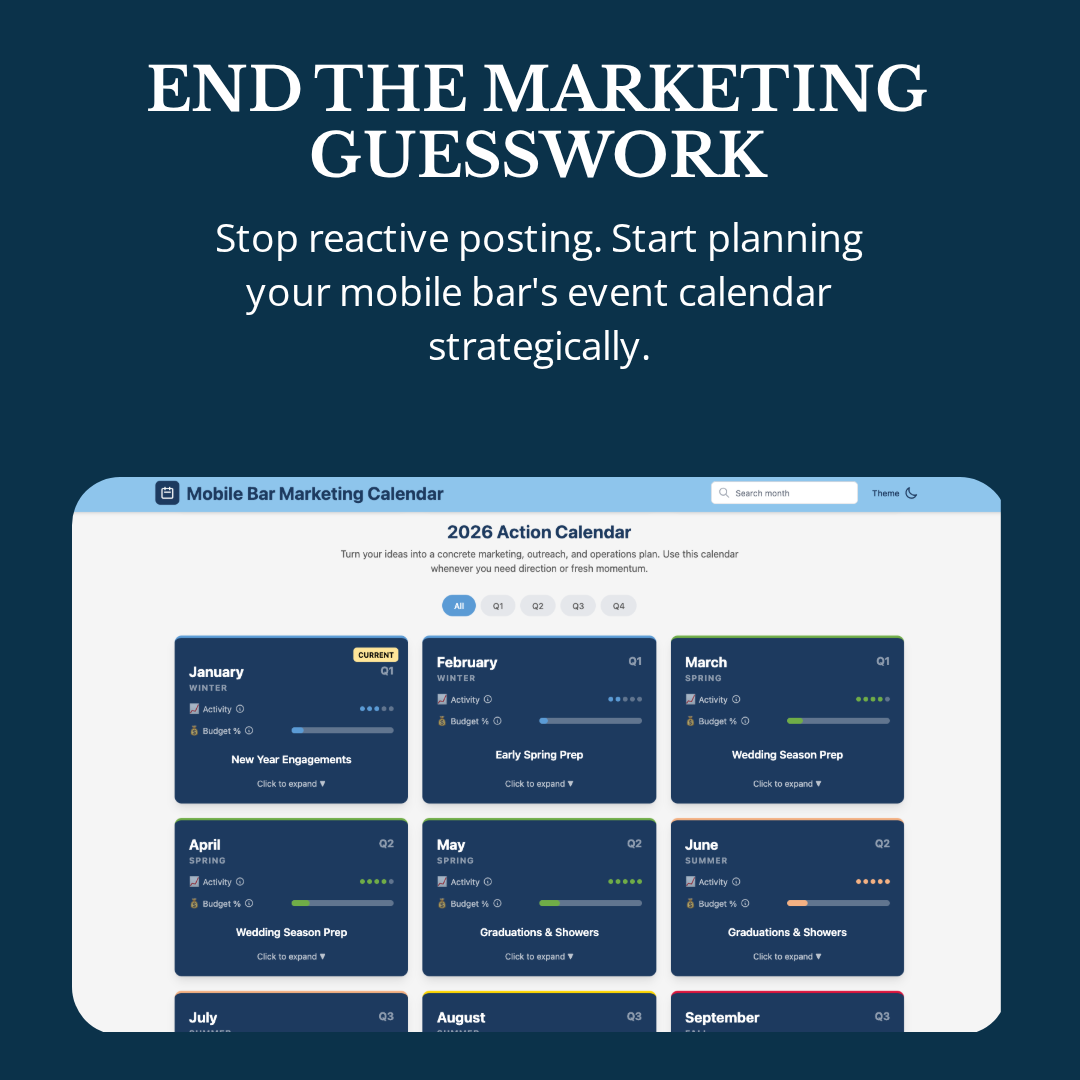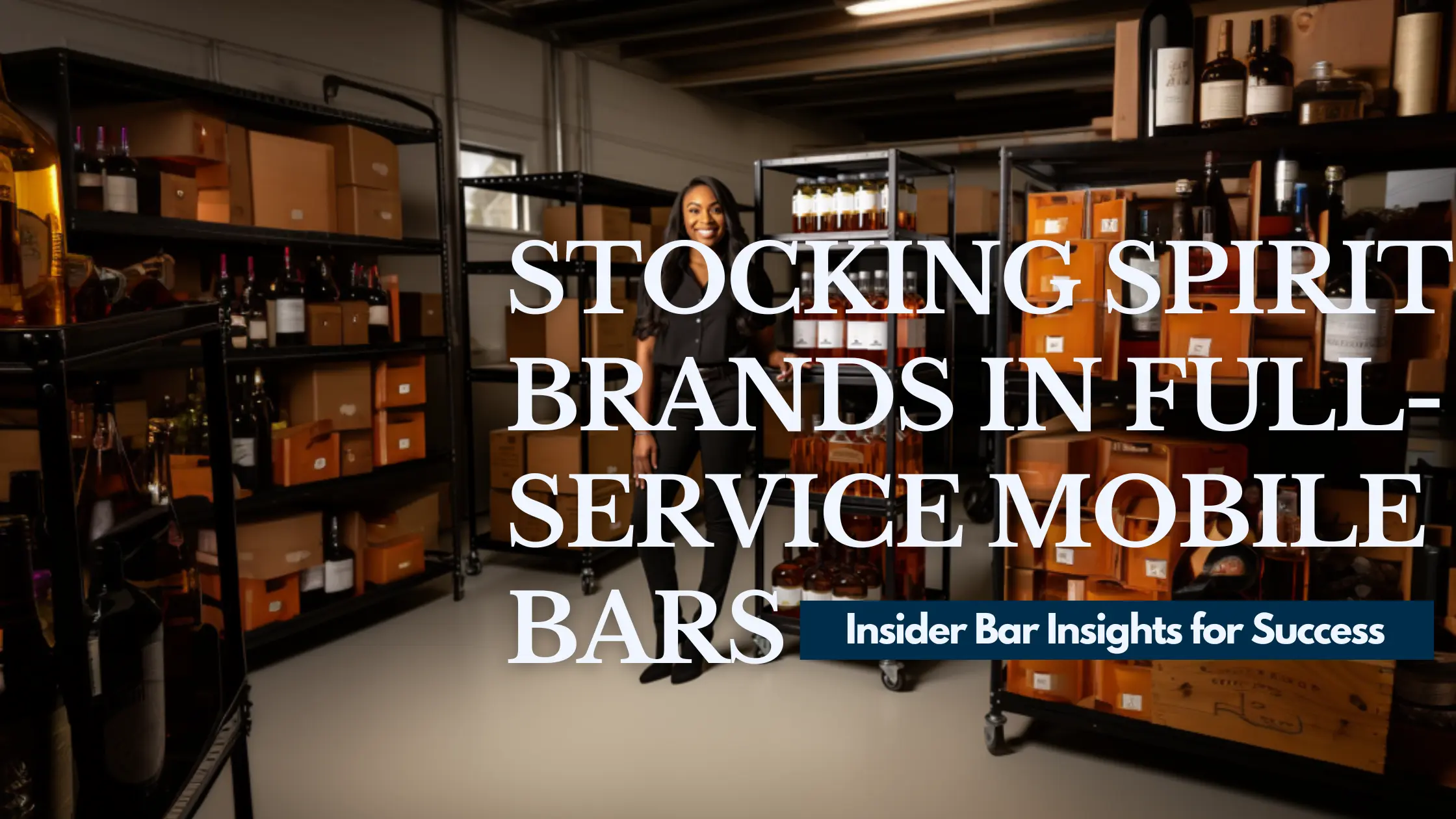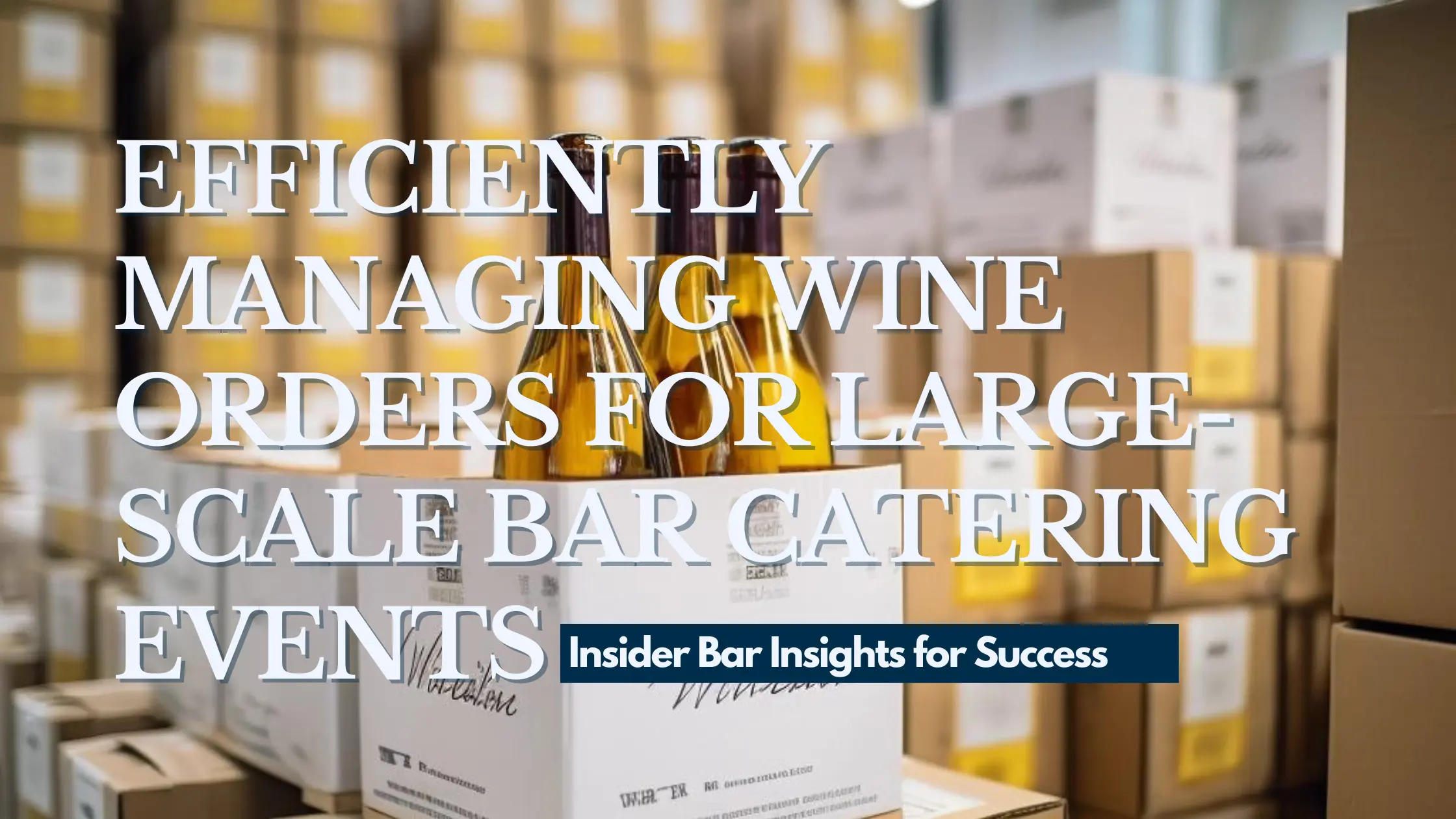As a mobile bar company, you know the importance of standing out in a crowded market. But with so many options online, how do you ensure engaged couples stumble upon your unique bar services?
Enter the world of online advertising, where Google Ads and Facebook Ads can become your secret weapons for attracting wedding clients and booking more events. But which platform reigns supreme? Fear not, this blog post will guide you through the key differences, benefits, and considerations of each platform.
Understanding the Jargon: A Crash Course in Acronyms
Before we dive in, let’s decipher some common acronyms you’ll encounter:
General PPC Terms:
- PPC (Pay-Per-Click): An advertising model where you only pay when someone clicks on your ad.
- ROI (Return on Investment): The measure of profit generated from an investment compared to its cost. In PPC, it refers to the revenue earned from ad clicks compared to your ad spend.
- CTR (Click-Through Rate): The percentage of people who see your ad and click on it. A higher CTR indicates a more compelling ad.
- CTA (Call to Action): A persuasive statement in your ad that encourages viewers to take a specific action, like booking a consultation.
Google Ads Specific:
- Keyword: A word or phrase people type into search engines. Your Google Ads target specific keywords relevant to your mobile bar service.
- Ad Rank: The position of your ad on the search results page, determined by factors like your bid amount and ad quality.
- Conversion: When someone clicks your ad and takes a desired action, like booking on your website.
Facebook Ads Specific:
- Demographic: Characteristics of your target audience, such as age, location, and income.
- Interest: Specific topics or hobbies that your ideal client might be interested in (e.g., “wedding planning”).
- Life Event: Significant milestones in people’s lives, like “engaged” or “recently moved,” which Facebook can target.
- Audience: A group of people on Facebook who meet your targeting criteria (demographics, interests, etc.).
Google Ads: The Search Engine Powerhouse
Imagine a bride-to-be typing “mobile bar service for wedding” into Google. With Google Ads, you can place your ad at the top of search results, putting your services right in front of potential clients actively looking for what you offer.
Example
Campaign: “Wedding Mobile Bar Bartender” Ad Group: “Luxury Wedding Bartending Service”, “Budget-Friendly Mobile Bartender”, “Craft Cocktail Bartender for Weddings”
Cost: While costs can vary depending on location, industry, and competition, you might expect to pay around $2-$5 per click for “mobile bar service” keywords.
Think of ROI like this: Imagine you invest some money (like planting seeds in a garden). ROI tells you how much “fruit” (revenue) you get back from that investment.
In our example, you spend $100 on a Google Ads campaign (planting the seeds). This campaign gets your ad seen by 20 people (the seeds sprout!). Out of those 20 people, 2 click your ad and book your services (those are the fruits!). Since each booking earns you $50, those 2 bookings bring in a total of $100 in revenue.
Here’s the key part: Your investment was $100 (planting the seeds), and you got $100 back in revenue (harvesting the fruit). So, your ROI is 100% because you earned back exactly what you invested!
The higher the ROI, the more money you make from your advertising efforts.
Facebook Ads: Reaching Beyond the Search Bar
Facebook Ads takes a different approach. Instead of targeting active searches, you can target a broader audience based on demographics, interests (think “wedding planning”), and even life events (like “engaged”). This allows you to connect with couples who might be passively considering a mobile bar for their wedding, sparking their interest and planting a seed in their minds.
Example
Campaign: “Elevate Your Wedding with a Mobile Bar” Ad Group: “Unique Bar Experiences for Weddings”, “Craft Cocktail Bars for Brides and Grooms”, “Full Service Mobile Bars”
Cost: Similar to Google Ads, Facebook Ad costs can vary, but you might expect to pay around $1-$3 per click for wedding-related audiences.
Think of ROI like this: Imagine you’re running a lemonade stand (your Facebook Ad campaign). You invest $200 on ingredients and setting up your stand (your ad spend).
Your ad reaches 1,000 people walking by (impressions), which is like getting a lot of attention! Out of those 1,000 people, 50 stop by your stand and click on your ad (clicks). That’s like having some people show interest in your lemonade!
Now, of those 50 people who clicked, 2 actually buy your lemonade (conversions). Each lemonade sells for $50, so you earn a total of $100 in sales (revenue).
Here’s the key part: You invested $200 to set up your stand (ad spend), and you made $100 selling lemonade (revenue). That means you got back half of what you invested! So, your ROI for this campaign is 50%.
The higher the ROI, the more “lemonade money” you keep after covering your initial investment.
Choosing Your Champion: Google Ads vs. Facebook Ads
So, which platform reigns supreme? The answer, like a well-crafted cocktail, is a blend of both. Here’s a quick breakdown to help you decide:
Use Google Ads if:
- You want to target couples actively searching for mobile bar rentals.
- You have specific keywords in mind that reflect your ideal clients’ search queries.
- You prioritize immediate conversions (bookings).
Use Facebook Ads if:
- You want to reach a wider audience who might be passively considering a mobile bar.
- You want to build brand awareness and showcase your unique offerings.
- You want to nurture leads and guide them down the conversion funnel.
The winning formula? Utilize both platforms, tailoring your campaigns to their specific strengths. Remember, testing and optimization are key. Start small, monitor your results, and adjust your approach to maximize your ROI and book more wedding gigs!




